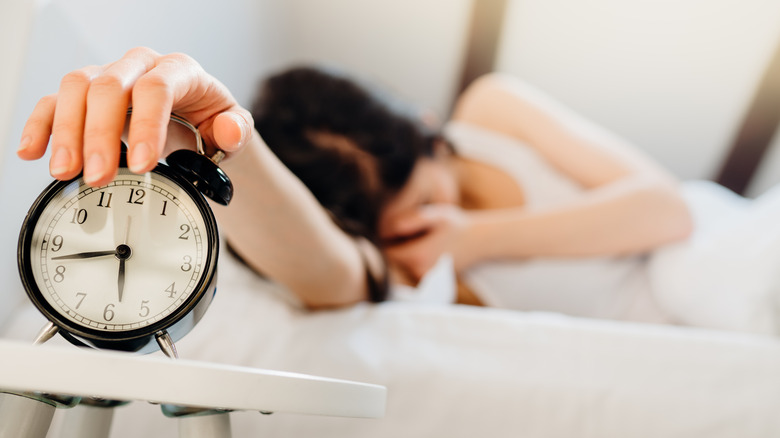What Really Happens When You Stop Taking Melatonin
A bout of insomnia can wreak havoc on your daily activities, and over time, lack of sleep can damage to your health. According to Healthline, if you are sleep deprived more often than not, you may experience memory issues, trouble focusing, weight gain, and even notice that you're catching the common cold more than usual. We can all agree, whether few or many, sleepless nights can be a nightmare.
When sleep is needed but hard to get, it's not uncommon to try an over-the-counter sleep aid, like melatonin, before heading to a specialist. Melatonin is a natural hormone made in the pineal gland in the brain, and it helps to regulate the body's sleep/wake cycle (via WebMD). Your body's melatonin levels will typically rise in the evening and drop in the morning, but the amount your body produces can depend on your individual body clock and daily sun exposure. To help assist with regulating the sleep/wake cycle, the Mayo Clinic states that melatonin supplements are generally safe, although some people, like those with an autoimmune disease, should avoid them.
You may lose sleep if you stop taking melatonin
That said, when taking melatonin, there are some key things to know about timing and dosage. Dr. Michael J. Breus, sleep doctor and clinical psychologist, tells Bustle that many people are taking too much melatonin, which can cause adverse symptoms like headaches, nausea, and drowsiness. Dr. Breus states that only one half to one milligram of the supplement is needed. He also points out that many forms of the pill can take up to 90 minutes to begin working, so you shouldn't wait until you're already tossing and turning to take your supplement.
Healthline reports that the supplement is not addictive, and that building a tolerance to it is unlikely. If you are relying on melatonin to keep your sleep/wake cycle regulated, and you decide to stop taking it, Young Minds reports that you are not likely to suffer withdrawal symptoms, but you might revert to your old and unsatisfying sleep habits. Unfortunately, there is not enough research on the long-term effects of melatonin use, and according to Johns Hopkins sleep expert, Luis F. Buenaver, melatonin is best used short-term. Furthermore, one study published in the British Journal of Clinical Pharmacology found that after three months of using melatonin, the beneficial effects started wearing off. If you are currently concerned about what might happen when stopping your melatonin intake, or if you are thinking of starting a melatonin supplement, it's wise to speak with your doctor.


